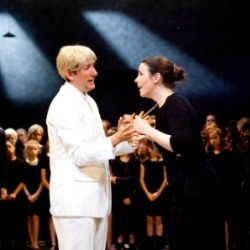The Adventures of Count Ory (Blackheath Halls)
There couldn’t be a greater contrast to last year’s Blackheath community opera, with the bloodletting of Verdi’s Macbeth followed in 2014 by the sparkling comedy of Rossini’s Le Comte Ory. For the eighth annual project who can blame the Blackheathers for indulging in an all-out romp that culminates in a hall full of drunken male nuns?

Re-fashioned as The Adventures of Count Ory, in a new translation by distinguished Rossinian David Parry, it proves once again that the words Blackheath Halls and triumph are synonymous.
A truly inclusive experience, this year sees another superb line-up of professionals working hand in glove with a huge team of amateur performers and schools selected from the area, two of them local special schools.
Rossini’s penultimate opera saw him characteristically plundering his own works and Le Comte Ory is full of numbers recognisable to anyone familiar with the slightly earlier Il viaggio a Reims. It’s material well worth recycling.
Nicholas Sharratt – now a Blackheath regular with three shows under his belt – is the title character, a philandering adventurer who turns up first in one religious disguise, as an evangelist preacher with dodgy blond wig, and later in another as wimpled pilgrim. His light tenor is perfectly placed for a role made famous in recent years by the peerless Juan Diego Flórez.
He’s more than matched by the glorious Anna Devin as the object of his desire, Countess Adele, and his rival in the form of little bro Isolier, perfectly captured by mezzo Kate Howden. Other seasoned pros Steven Page (Ory’s tutor) and Louise Winter (Ragonde) are joined by fast-rising Benedict Nelson as the wily Raimbaud and Trinity students Benjamin Ellis, Guy Elliott, Clare Barton and Zoe Freedman in smaller roles.
But as easy as it would be to dwell on the delights of the principals, it’s the magnificent chorus that deserves most attention, as that is ultimately what the project is about. Harry Fehr (who previously directed L’elisir d’amore, Eugene Onegin and Cendrillon at this address) works wonders in imbuing each chorus member with a fully-rounded character, which in the first scene includes a dazzling array of milkmen, lawyers, schoolgirls, butchers and a circus clown (full marks too to Costume Supervisor Felicity Langthorne). MD Nicholas Jenkins draws thrilling sounds from them.
With designer Max Dorey, Fehr creates an exciting space in the centre of the hall and also utilises the venue’s actual stage, an inspired touch marred only slightly by some clarity issues when the vocalists have the orchestra between them and the audience.
The orchestra itself is on storming form, with Jenkins conducting a tireless and nimble account of Rossini’s quick-fire score that keeps the silliest of plots moving at top speed.
Opera up close has come into its own in recent years, but usually without the thrill of having a full chorus just inches from the audience. In terms of breaking barriers, the Blackheath project achieves what many would like to, but rarely can, by putting opera at the heart of the community.










